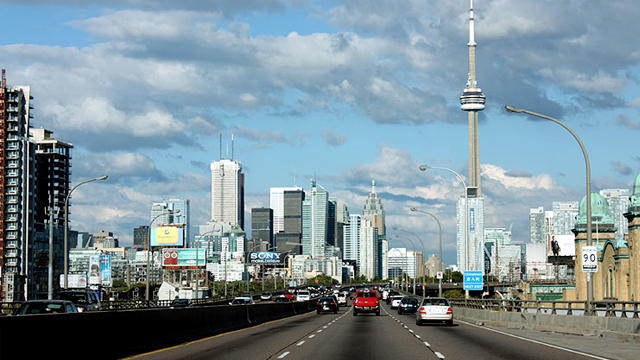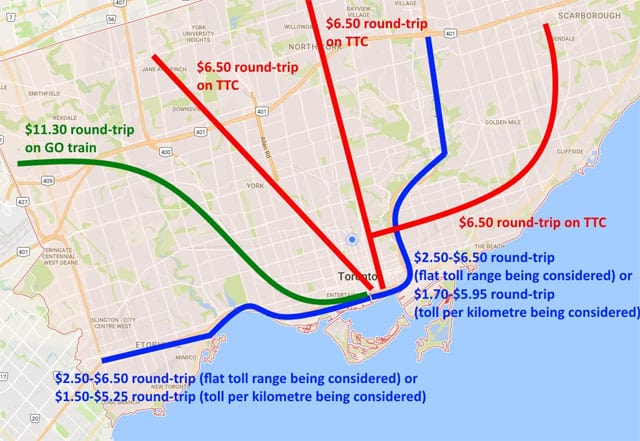Should Mississauga Take a Cut of Toronto’s Toll Road Earnings?
Published November 28, 2016 at 5:34 am

It seems like the man found a way to build his wall after all.
No, not Donald Trump (that wall may never get built nor will Mexico actually pay for it), but rather Toronto Mayor John Tory, who made the shocking announcement last week that he is backing road tolls on the Don Valley Parkway and Gardiner Expressway. The money raised from said toll will go to building vital public transit infrastructure projects, presumably Tory’s beloved Smart Track, the Waterfront LRT and existing road improvements.
Tory’s changing position comes after a long public record of changing his mind on this issue. He was against road tolls in 2003 when he ran to become Toronto’s mayor the first time. As a private citizen and a radio host on Newstalk 1010 in 2013, he supported road tolls as a revenue tool. But in 2014, during his second, successful mayoral run, he again came out against road tolls. Now he’s backing them (probably realizing that no other credible sources of revenue were available).
So here are some of my thoughts:
The Effect on Mississauga
Mississauga Mayor Bonnie Crombie’s press release said, “He (Tory) has chosen to implement road tolls that will not only affect residents in his city, but those in the 905 as well.”
That is true; Mayor John Tory’s road toll would most likely hit the 40 per cent of people who use the Gardiner and DVP who are not Toronto residents more than Toronto residents themselves. But you can detect some frustration in her tone that Mississauga commuters are going to be dinged by a toll when she really has no control over this situation; the DVP and Gardiner are owned by the City of Toronto, and Toronto has the power to raise revenues, unlike other Ontario cities.
But Crombie also advised caution as to how this money gets allocated properly.
“I would caution him though that he must ensure that every penny of the money collected is reinvested into the repairs of the Gardiner and DVP, as well as into regionally-integrated transit projects that connect the 905 and the 416. Residents need to see that this money is not going into general revenue, but directly into projects that address the dire problem of gridlock and congestion. People simply want to be able to move more quickly and easily around the GTA and any money that is collected must make this happen,” Crombie said in her press release.
An interesting point could be made that as a growing number of Toronto residents now commute for work into Mississauga (as Crombie herself frequently mentions that Mississauga has become a net importer of jobs) wouldn’t it be nice if Mississauga could make a business case that a percentage of the road toll money should be sent to Mississauga for taking in Torontonian workers who don’t pay taxes in Mississauga? Or perhaps because scores of Torontonians take the Gardiner on the way to Pearson International Airport, which is in Mississauga. That’s basically Tory’s argument isn’t it? Having some extra revenue lying around would be fantastic in paying for Mississauga’s public transit projects.
It’s at least heartening to hear Tory say that he does want the road toll money to be put in a specifically dedicated fund, and not into general government revenues. Tory also mentioned that he wants the fund overseen by a non-political third party and audited annually by the Toronto Auditor General. Those comments echo Mayor Crombie’s; at least they’re in agreement over that, rather than the kerfuffle over Smart Track they had weeks ago.
There’s Too Much Revisionist History From Those Opposed
Former Toronto councillor and mayoral candidate Doug Ford, several other anti-tax and spending advocates and angry people I’ve heard on call-in radio shows, keep going back to a familiar refrain. It comes down to something like this:
“if we had been building this 20 years ago, if our politicians were smarter back then, if we just kept building the subway 1 km every year, we wouldn’t have to be doing this today.” I’m so sick of hearing this from people talking about ‘ifs’, who seem to think that there is a time machine lying around that we can use to change history. These people just complain about the problems, whine about paying more, but when asked what they would propose as an alternative, don’t propose anything realistic.
There is one idea that comes up, and that’s cutting waste in government to pay for transit projects. How reasonable is that, and how much money can you actually raise? Various reports and statistics show that cutting existing government services, or reducing salaries, would only yield a few million dollars, compared to the some $300 million from a road toll. And saying “stop the gravy train” means you’d be cutting essential services, like police, fire, garbage pickup. But here’s the thing, those anti-toll guys don’t tell you that; they hope to put the blinders on you and pray you vote on emotion and instinct and against bad medicine you actually need in favour of hearing something that sounds better but doesn’t do anything in the long run.
If you think Canada is immune to stupid politics, then look down south, look at the new president-elect, Donald Trump, and consider whether Canada can succumb to hyperbolic nonsense. Remember Rob Ford?
Congestion Pricing > Road Tolls
Here’s something for those marketing and communications professionals out there…maybe they just need to call it something else.
Perhaps just the word ‘road toll’ is inciting some strong emotions today. In other jurisdictions, it’s called congestion pricing. Various places in the world use some kind of congestion charge for people driving into the downtowns or city cores of their largest cities. When you hear the word ‘road toll,’ you react negatively. Judging from some of the comments I heard on the radio, people feel that there is a literal hand from the government reaching into their pockets for their money.
Congestion is a bad thing, and pricing is a more milder term than ‘toll’. The words ‘congestion pricing’ put together sound more like an indication of putting a price on a bad thing, like the debate about putting a price on carbon. ‘Congestion pricing’ at least sounds like something that has a purpose, rather than just something that is taken from you for no reason.
And if you still think this is going to be expensive…
I found this pictogram from a Twitter user named Cameron MacLeod (@c_9) that actually shows downtown residents, if they’re using systems such as the TTC or GO Transit, are actually paying more than the proposed $2 per trip on the DVP and Gardiner.










